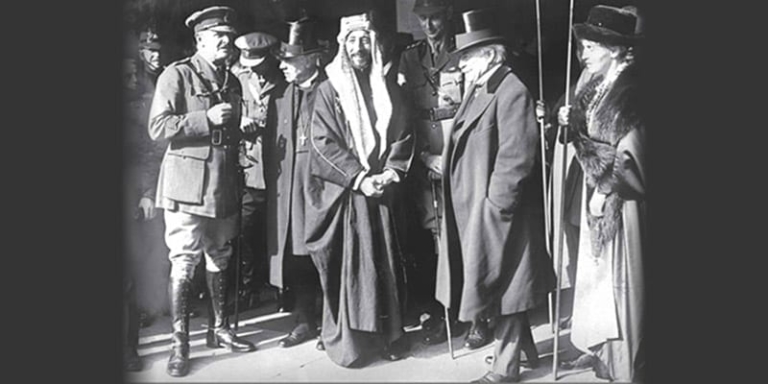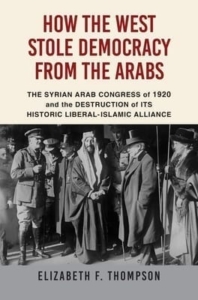
Writing about the modern history of the Arab world can be a gratifying endeavor despite the serious complications and tribulations that have beset the region since the beginning of the twentieth century. None of today’s Arab countries were fully independent then. The Ottoman Empire, the Sick Man of Europe, was in control of the eastern Mediterranean and the western coastal areas of the Arabian Peninsula. Great Britain enjoyed a vast empire that included Egypt and Sudan, southern Yemen, and Oman and the Trucial States in the Gulf. France held on to the North African areas of today’s Tunisia, Algeria, and Morocco. But all the powers were in a competition either to hold on to territories or expand their reach to others. In fact, it is hard to see the history of the Arab world in isolation from the rivalry, competition, and conspiracies that bedeviled the last few decades of the Ottoman-British-French colonial expanse, one that stretched throughout what today is the Middle East and North Africa.
 The specific case of the history of today’s eastern Mediterranean countries of Lebanon, Syria, Iraq, Jordan, and Israel/Palestine as well as of the Arabian Peninsula can best be understood in the context of the events of the early twentieth century. This is the contribution of Elizabeth Thompson’s new book, How the West Stole Democracy from the Arabs: The Syrian Arab Congress of 1920 and the Destruction of Its Historic Liberal-Islamic Alliance. Relying on the meticulous collection of multi-sourced materials and historical archives from Arab and European capitals, cities where events transpired, and long-lost memoirs later discovered, Thompson weaves a coherent narrative of one of the most important chapters of Arab history. Indeed, her venture is welcome, admirable, and, importantly, fruitful in illuminating––most specifically to western and American audiences––how the Arabs were cheated out of a democratic experiment that could have set them on a much different trajectory than the current authoritarian nightmare from which they cannot seem to awaken.
The specific case of the history of today’s eastern Mediterranean countries of Lebanon, Syria, Iraq, Jordan, and Israel/Palestine as well as of the Arabian Peninsula can best be understood in the context of the events of the early twentieth century. This is the contribution of Elizabeth Thompson’s new book, How the West Stole Democracy from the Arabs: The Syrian Arab Congress of 1920 and the Destruction of Its Historic Liberal-Islamic Alliance. Relying on the meticulous collection of multi-sourced materials and historical archives from Arab and European capitals, cities where events transpired, and long-lost memoirs later discovered, Thompson weaves a coherent narrative of one of the most important chapters of Arab history. Indeed, her venture is welcome, admirable, and, importantly, fruitful in illuminating––most specifically to western and American audiences––how the Arabs were cheated out of a democratic experiment that could have set them on a much different trajectory than the current authoritarian nightmare from which they cannot seem to awaken.
To be sure, Thompson’s book is daring in attempting to explain the machinations western colonialism––exemplified primarily in British and French policies and practices––used to keep the eastern Mediterranean from true independence and its necessary accompaniment, democratic politics. One can imagine how challenging and complicated it was to gather information about colonialists in London and Paris who tried hard to conceal their designs to control the area abandoned by the defeated Ottomans. Equally difficult must have been the collation, translation, and sequencing of Arabic sources left and forgotten in dusty old archives in Damascus, Baghdad, Beirut, Aleppo, and myriad other cities that witnessed the Arabs’ failed attempts at establishing a democratic polity at the beginning of the twentieth century. Thankfully, Thompson had great help from many sources she elegantly recognizes in her lengthy and well-written acknowledgement statement.
How the West Stole Democracy from the Arabs tells the story of the serious effort to establish a constitutional monarchy in today’s eastern Mediterranean region by Prince Faisal Ibn al-Hussein, the son of Sharif Hussein Ibn Ali al-Hashimi, ruler of the Hijaz region in present-day western Saudi Arabia. Faisal had led Arab forces from the Arabian Peninsula––after Sharif Hussein joined the western allies in the First World War against the occupying Ottoman army––and conquered the areas vacated by the Ottomans east of the Mediterranean, reaching present-day northern Syria. Along the way, Faisal struck alliances with nationalist Arab leaders who were agitating for independence from the Ottoman Empire, which had ruled the area since the middle of the 16th century.
Faisal and his cohorts confronted the colonial designs of the British and French on the eastern Mediterranean, notably the 1916 Sykes-Picot agreement dividing Greater Syria from Iraq. That arrangement was the progenitor of the San Remo Agreement of 1920 that consecrated a so-called “mandate system” through the newly established League of Nations, whose members believed that the peoples of the area were not mature enough to govern themselves. Reading the book provides simultaneously sad, ironic, maddening, and disappointing details about Faisal’s meetings with British, French, and western officials, the majority of whom were hell-bent on denying him and the millions of Syrian and Iraqi Arabs their right to speak for themselves. Particularly poignant, indeed galling, was the fact that other national groups such as Bulgarians, Greeks, and Czechs, to name a few, were accorded that right; the Arabs, however, did not seem to deserve it, from the colonialists’ point of view. According to Thompson, it was obvious that in addition to French and British colonial designs, the perception that all Arabs were Muslim––while in reality many Christian Arabs were fighting alongside Faisal to establish that independent state––and their dark complexion were great impediments to European approval or support.
Apparently, no rights enshrined in US President Woodrow Wilson’s Fourteen Points and his vision for a postwar international peace would extend to the Arabs. Nevertheless, Faisal and his cohorts held a deep belief in Wilson’s principles and a continued hope that, eventually, the United States would come to their aid. But it did not. Classical colonialist thinking about “lesser peoples” could not be overcome, despite Wilson’s appointment of the King-Crane fact-finding commission of inquiry that undertook an investigation in1919 and found that an overwhelming majority of the area’s inhabitants desired an independent Arab state. Incidentally, even Wilson himself did not appear to really care about what happened to the Arabs, especially after he ran into trouble with his domestic Republican opponents, following the ignominious fate of his proposal for the creation of the League of Nations. In fact, the King-Crane commission’s report was never made public until later, and by then it had become inconsequential.
Thompson details Faisal’s and his cohorts’ many travels and diplomatic contacts with anyone in London, Paris, and elsewhere who was ready to listen to their legitimate demands for an independent state. One of Faisal’s shocks was when he, as representative of the King of Hijaz, found out that he did not even have a seat at the table at the Paris Peace Conference of January 1919. The famed T.E. Lawrence––who remained friendly and loyal but ineffective in changing British policy––interceded with then-Prime Minister Lloyd George for the prince from Arabia to participate in the discussions and present his demands. Faisal had already been told by British officials that “the road to independence ran through Paris” (p. 60), where colonialists were ensconced in the foreign ministry and the prime minister’s office. Additionally, despite his valiant efforts, Faisal eventually came to the realization that his military weakness, combined with British and French perfidy and racism, were the most formidable impediments to realizing his hopes.
But despite all, Faisal and his associates went forward with their plan to establish a constitutional monarchy. They declared independence in March 1920 and promulgated a constitution, despite Sharif Hussein’s opposition to separating the eastern Mediterranean from his Hijazi domain. This was perhaps one of the book’s most intriguing details and it shed great light on the original contention that an Arab from the peninsula (whether it was Faisal or his father) considered himself as having enough legitimacy to lay claim to historical Syria. To be sure, this could be the topic of another illuminating book Thompson may write in the future in which she could explore whether it was Sharif Hussein’s and his son’s Arab identity or the religion of Islam that justified the attempt. In the end, the historical record and actual reality attest to the failure of the project––principally because of British and French objections. Sharif Hussein also lost his Hijaz kingdom to the upstart from Najd and founder of modern-day Saudi Arabia, Abdelaziz Al Saud. Faisal was exiled from Syria by the French then compensated by the British as king of Iraq, which was then under their control in accordance with the same mandate system that robbed him of Syria.
While this review cannot possibly cover all the contents of Thompson’s book, it should not discount the role and influence of Faisal’s associates who hailed from present-day Syria, Lebanon, Iraq, and Palestine and were as enthusiastic and eager to exploit the end of Ottoman rule by realizing an independent state. They included Nuri al-Said, who later became prime minister in mandatory Iraq; Rashid Rida, the religious intellectual who can be considered the father of the Muslim Brotherhood before Egypt’s Hassan al-Banna made it a political movement; and a number of others such as Hashim al-Atassi, Fawzi al-Azm, Awni Abdelhadi, Izzat Darwazah, Michel Lutfallah, Ahmad Qadri, Abdel-Rahman Shahbandar, Riad al-Solh, and Nazik al-Abid (a Kurdish women’s rights campaigner). All of them were vested in the project of a free Arab state over which they were ready to anoint Faisal as king in a constitutional monarchy that respected human rights and the rights of minorities. Their disagreements with him surfaced when he showed some autocratic tendencies and when he had too much trust in the British. In the end, many of them, like him, had to reconcile themselves with the mandate system and find accommodations with British and French colonialists.
The fight for an independent Arab state in the eastern Mediterranean was a truly gallant endeavor by ambitious and well-meaning patriots. Thompson’s book relates their trials and tribulations in admirable detail. Further, the book explains their most consequential shortcoming which, in great measure, was not their fault; to coin a phrase, Faisal and his associates were operating in “the realm of a triumphant West,” politically, economically, and militarily. Even Woodrow Wilson could not temper the appetites of colonialists in Paris and London. Seekers of independence were only able to plead their cases to those who did not see them as equal; at the end, they had to accept the dictates of raw power. In the final analysis, the democracy they sought to implement was stolen from them by the very states that, ironically, preached and practiced it in their own western and Christian societies.
Thompson’s work offers new approaches and adds rich detail to the history of the Arab world. Her book represents important coverage of a pivotal node that set the stage for developments in the eastern Mediterranean since 1920. How the West Stole Democracy from the Arabs will serve as a good resource for academics, journalists, decision-makers, students, and the general public and provides an accessible and important addition to any library or Middle East collection.

